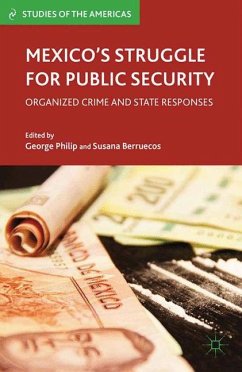The Mexican government's full-frontal attack on the powerful drugs cartels has achieved mixed results. This book considers the issue from a variety of viewpoints. The essential argument is that the organized crime is best combated by institutional reforms directed at strengthening the rule of law rather than by a heavy reliance on armed force.
"Mexico's Struggle for Public Security: Organized Crime and State Responses - a new examination of Mexican organized crime - stands above the many publications already issued on this subject . . . This publication is an insightful and multidisciplinary analysis of Mexico's public security issues, which provokes thoughtful reflection on a complex reality. . . and offers feasible paths to progress that emphasize a shared responsibility in confronting the complex problem of organized crime." - Journal of International Affairs
"Editors George Philip and Susana Berruecos have overseen a volume with a remarkably diverse range of commentary on the current state of the Mexican government's increasingly military driven conflict with drug trafficking organizations (DTOs)." - Criminal Law and Criminal Justice Books
"This book provides a balanced view of the current situation in Mexico. The editors and authors did an exceptional job and the readers will not be disappointed. Far from the fuss, this book takes a broad look at a pressing topic in Mexico's agenda: public and national security. It goes beyond mechanistic explanations to explore social attitudes, political decisions, and institutional weakness, as well as their consequences in reshaping the new context. No one seeking to understand the Mexican challenge can afford to ignore this inspiring and insightful book." - Leonardo Curzio, CISAN UNAM
"Editors George Philip and Susana Berruecos have overseen a volume with a remarkably diverse range of commentary on the current state of the Mexican government's increasingly military driven conflict with drug trafficking organizations (DTOs)." - Criminal Law and Criminal Justice Books
"This book provides a balanced view of the current situation in Mexico. The editors and authors did an exceptional job and the readers will not be disappointed. Far from the fuss, this book takes a broad look at a pressing topic in Mexico's agenda: public and national security. It goes beyond mechanistic explanations to explore social attitudes, political decisions, and institutional weakness, as well as their consequences in reshaping the new context. No one seeking to understand the Mexican challenge can afford to ignore this inspiring and insightful book." - Leonardo Curzio, CISAN UNAM








